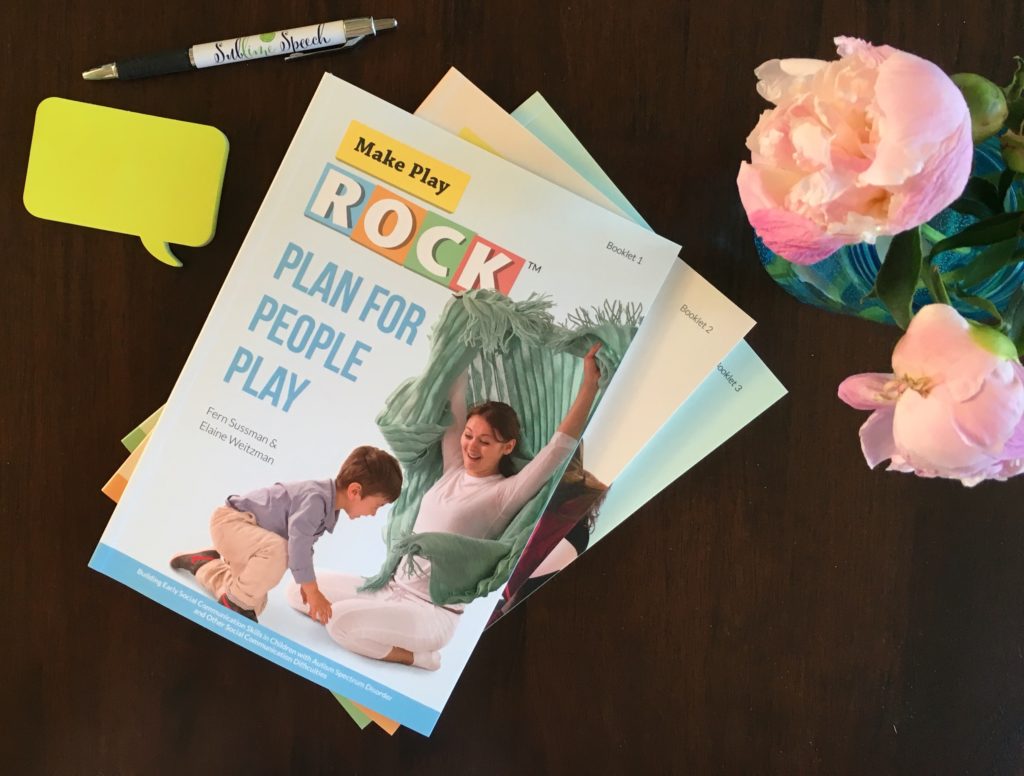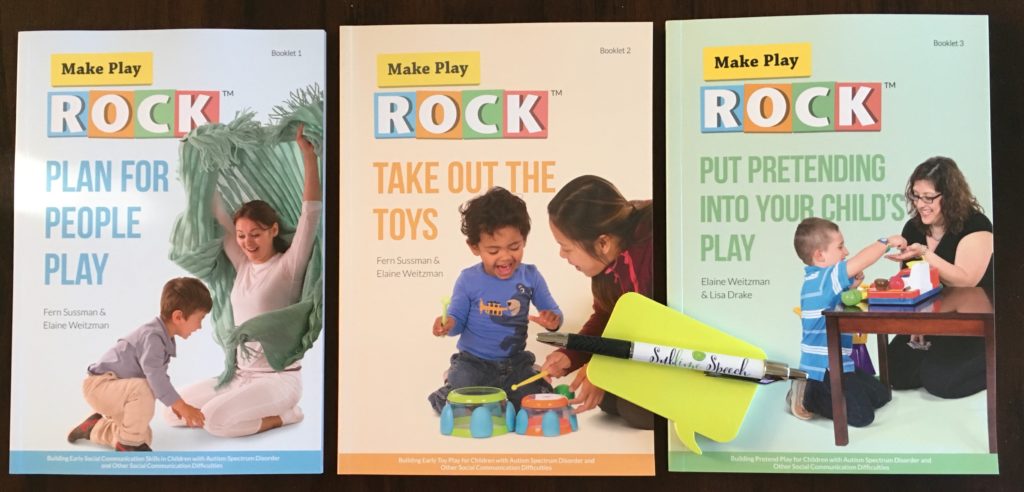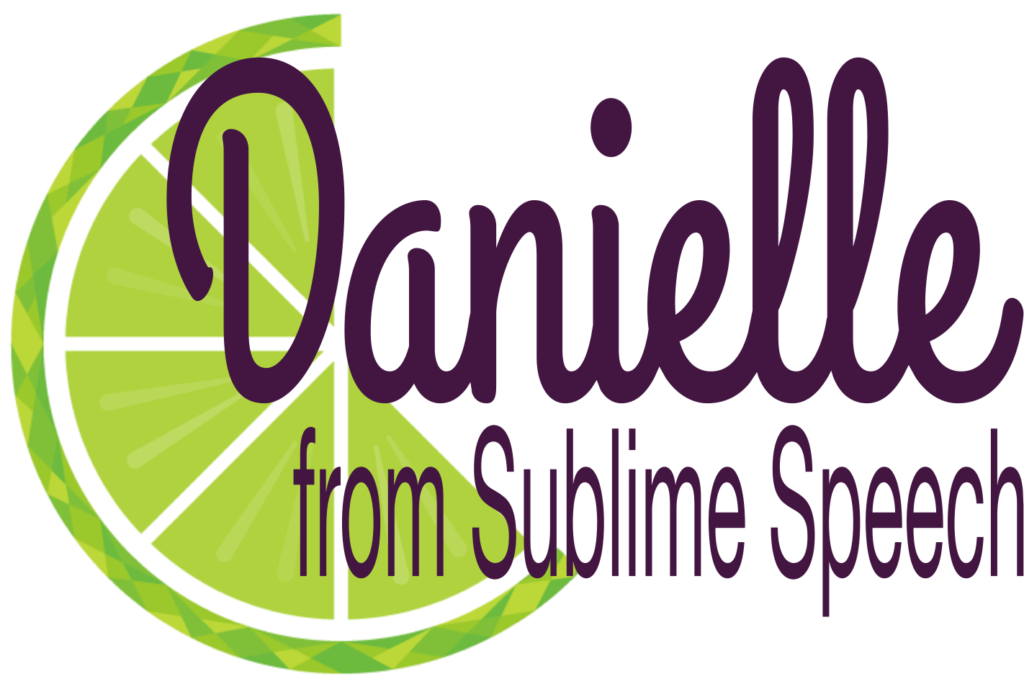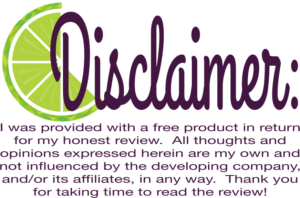It is Autism Acceptance month! Before becoming an SLP, I had very little knowledge or awareness of Autism. I am hopeful that the acceptance of autism continues to increase and that we continue to celebrate what makes each of us the unique humans that we are.
To start off the month, I would like to give you a sneak peak into The Hanen Centre‘s great booklet series called Make Play R.O.C.K and give you a chance to win a set (see below)! These booklets are designed to for parents (and therapists) to assist young children with autism who have difficulty learning to play. This great series of booklets (50-80 pages each) give parents and clinicians practical, research-based strategies for helping children expand their play skills through everyday activities!

Because play skills have been linked to the development of skills such as language, vocabulary, social skills, and problem-solving, it is an incredibly important part of a child’s life. As a therapist, particularly when I was providing early intervention and Pre-K services, it was important to empower parents to be their child’s therapist in many ways. They spend the most amount of time with their children. However, I always found that teaching parents how to play with their children in a beneficial way was always a surprisingly difficult task. These booklets could be very helpful for this purpose.
Booklet 1: Plan for People Play
This booklet discusses ideas for building a child’s interaction and communication skills by playing games that focus on interaction over toys. I love the language that this, and the other booklets are written in – so parent-friendly! This booklet has a nice “People Play Interaction Checklist” which help parents to identify what their children can already do and what next steps will be. The booklet also discusses Hanen’s “O.W.L.” technique (Observe Wait Listen) to help parents interact in the most beneficial ways. It also introduces the Repeat, Offer opportunities, Cue, and Keep techniques which make up the R.O.C.K. method. It gives great examples of what this method would look like. Additionally, the book references the sensory needs of young children with autism. Finally, it begins to walk parents through some games at each stage of play. The booklet also includes a “People Game Plan” for parents to develop a plan for their children.
In the second booklet, toy play skills are discussed. This booklet discusses typical toy stages for children and how children with ASD may differ in their development. Again, this booklet includes a “What’s My Play Style” quiz to assist parents in parents in finding their style of play and adjusting as needed to help their child. The booklet then gives incredibly parent-friendly tips on facilitating play. I always found myself giving these tips to parents during sessions and modeling it. I think this would have been a very nice supplement to my sessions for parents to continue the work during the week. Another section of the booklet discusses next steps for play. Parents determine how their children currently play and what next steps for them are. There are also great suggestions for types of toys to help facilitate the acquisition of certain toy skills. Finally, the booklet discusses ways to R.O.C.K. the child’s play and examples of that before concluding with a “Toy Play Plan” for parents to complete.
Booklet 3: Put Pretending into Your Child’s Play
This booklet builds upon the previous booklets, or stands alone, as a resource to help parents expand their child’s pretend play skills during everyday activities. This booklet begins by discussing pretend play and the importance of those skills, sequence of pretend play development, and how pretend play may differ in children on the autism spectrum. The booklet then discusses next steps, including a mini checklist of for parents to determine how their child plays and what steps would be next for their play style/skills. There is also a checklist for parents to determine what their play style with their children is and ways to adjust those styles to benefit their children. Like the other booklets, this discusses R.O.C.K. and examples of implementing that technique. The booklet wraps up with a “Pretend Play Plan” for parents to complete.

Overall, these booklets are an incredible resource for parents and for clinicians. I found the parent-friendly language and progression to be very easy to follow. I could see these being used by parents of children with autism as well as children with general developmental delays. The complete set sells for $42 (before taxes and shipping). I feel that this price is fair for the amount of information received in these booklets. It would make a practical addition to the libraries of clinicians working in Early Intervention and Pre-K as well.
Now, to our giveaway from Hanen… Enter below! But don’t worry, everybody is a winner with their Autism Awareness Month coupon codes – Save on More Than Words, TalkAbility and the Make Play ROCK booklets with “AAM2017” on their Teaching Tuning In, Coaching Parents in How to Play or Starting Early e-Seminars with “AAMSEM17”.

About The Hanen Centre: Founded more than 35 years ago, The Hanen Centre is a Canadian charitable organization with a global reach. Their mission is to provide parents, caregivers, early childhood educators and speech-language pathologists with the knowledge and training they need to help young children develop the best possible language, social and literacy skills. This includes children with or at risk of language delays and those with developmental challenges such as Autism Spectrum Disorder. They fulfill their mission by:
- creating programs in which groups of parents and other caregivers learn how to promote children’s language and literacy development during everyday activities
- training speech-language pathologists/therapists to lead Hanen Programs and to use the Hanen approach in their day-to-day work with families and educators
- developing outstanding, user-friendly materials for parents and professionals that break down the latest research into practical, usable strategies
- participating in leading-edge research in our field to ensure that our programs are evidence-based

I’m still in grad school, so I use a lot of the parent letters/info sheets we have in the clinic!